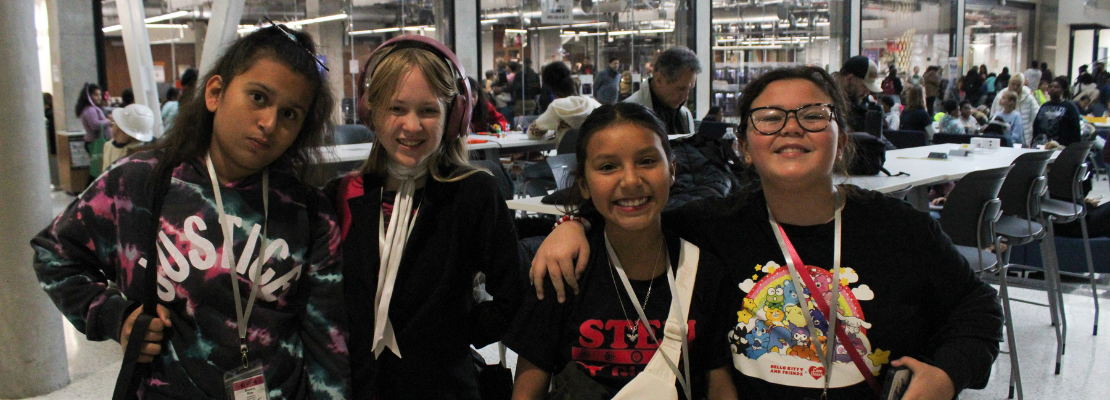Science, technology, engineering, and math (STEM) shape nearly every aspect of our daily lives, influencing the world around us in countless and ever-expanding ways. When we drink clean water from the tap, environmental scientists and chemical engineers work behind the scenes to monitor and treat water supplies. When we make a video call to friends or family, electrical engineers and computer scientists ensure that signals travel quickly and clearly across networks. And now more than ever, we engage with artificial intelligence (AI) in growing ways, from the wearable fitness trackers that analyze exercise and sleeping patterns to algorithms and data analytics that help companies recommend products we might like based on our preferences and previous purchases.
STEM fields and professionals are vital to advancing knowledge, strengthening communities, and solving complex problems —from climate change and chronic diseases to challenges in designing sustainable infrastructure and modernizing transportation systems. Women STEM professionals are central to driving transformative change. For example, Dr. Victoria Herrmann, a climate researcher at The Arctic Institute, studies the impacts of climate-induced displacement and migration. Cynthia Aguilera, a carpenter with 10 years of experience, builds hospitals, clinics, and schools while mentoring other women in the industry. Dr. Amanda Masino uses heart disease patient data to uncover health disparities that disproportionately affect African American and Latinx communities.
Gender Inequities in STEM Persist
STEM fields need diverse perspectives and experiences to drive innovation and solve multifaceted problems, yet, women continue to be underrepresented in most STEM fields in higher education, apprenticeship programs, and the workforce. As a result, we are deprived of women’s unique perspectives and experiences, and women are disproportionately excluded from high-paying sectors that are expected to continue to grow with advances in technology.
Women’s underrepresentation in STEM is the product of a complex web of inequities that are rooted in and connected to larger systems of oppression, including patriarchy and systemic racism. There are a variety of factors that hinder and often exclude girls' and women's participation and access to STEM education and career pathways, including stereotypes about STEM professionals and careers, curriculum that is personally and culturally irrelevant to girls, gendered messages and expectations from teachers, parents/caregivers, peers, the media and popular culture, and lack of access to relatable women role models and mentors. For girls of color, gender, race, and ethnicity work in complex and overlapping ways to create compounding barriers to STEM learning, access to resources, and belonging.
Women constitute 35% of the STEM workforce and are concentrated in different fields than men. The greatest gender disparities in higher education and the workforce are in computer sciences, engineering, and physical sciences. The intersectional impacts of gender, race, and ethnicity are made visible when we consider women of color, as Black, Hispanic/Latina, and Indigenous women earn 14% of the bachelor's degrees in STEM fields and represent less than 10% of the STEM workforce. (See NGCP’s State of Girls and Women in STEM report.)
Recent data shows that women make up 3.2 % of plumbers, pipefitters, and steamfitters, 4.5% of installation, maintenance, and repair occupations, and 4% of workers in construction occupations. Women represent only 14.4 percent of registered apprentices, paid training programs with on-the-job learning and classroom instruction that provide a pathway to employment and offer an alternative to college. The gendered occupational segregation is particularly evident in apprenticeships, as 61% of women in registered apprenticeships are in occupations including health care, educational instruction and library, and personal care and service, which have historically had lower hourly wages and are female-dominated. In contrast, women made up 5% of construction and extraction apprentices, and less than 5% of installation, maintenance, and repair apprentices, occupations with historically higher pay that have been male-dominated.
When women enter and work in STEM careers, they are often confronted with discrimination and harassment. Women experience high rates of sexual harassment in science, engineering, and medical education and careers. According to the Institute for Women’s Policy Research, 47.7% of women in the construction trades reported: “They are held to a different standard than their male co-workers, face discrimination in many aspects of their work, and sometimes contend with an unsupportive if not hostile work environment”. In academia, biases in recruitment, obstacles related to accommodating family needs and childcare, unequal resource allocation and mentoring access, and higher teaching loads are common.
The gender inequities do not stop there. Women have lower median earnings than men in all STEM and STEM-related fields. In 2020, while the median earnings for men with at least a bachelor’s degree were $97,000, women’s median earnings were $74,000. In the skilled technical workforce, men’s median earnings were $50,000, while women’s were only $41,000. Men make more than women across STEM fields regardless of whether they have an advanced degree. Moreover, in 2023, the gender wage gap for women who started employment after an apprenticeship was 35.7%, as the median hourly earnings for women were $22.00 per hour compared to $32.20 per hour for men.
Fostering Transformative Change
Increasing women's representation in STEM is not simply about adding more women to these fields or preparing more girls to enter STEM careers. Instead, it involves changing normalized (gendered, racialized, classed) practices and systems that infringe upon women's rights and gender justice in all aspects of society. When we strive for gender equity in STEM fields, we support women's right to pursue their interests, secure economic mobility, and protect their livelihoods. We work to foster diverse representation in fields central to our daily lives and our futures.
Take Action
National STEM Day is an opportunity to raise awareness and foster change. We all can play a role in shifting discriminatory practices that hinder girls' and women's participation and access to STEM. Below are resources for allies, educators, and parents/caregivers to support girls and women in STEM. By doing this, you are part of a broader movement to shift gendered narratives and foster greater equity in STEM spaces and beyond.
- Become a STEM Champion for Girls: Volunteer one hour to take NGCP’s self-paced online training to learn how to be an effective champion and support girls in STEM. The training is for professionals from diverse industries to learn how to advocate for girls in STEM effectively. Take action, become a champion for girls.
- Counter stereotypes about STEM people, skills, and career pathways: Break stereotypes explicitly by talking about stereotypes with girls and youth, and implicitly by incorporating books, media, and activities that showcase the diversity of STEM people, their characteristics and skill sets, and lived experiences. Take action with NGCP resources and webinars.
- Make STEM careers personally and culturally relevant for girls: Get to know girls and learn about their interests, knowledge, skills, culture, and lived experiences. Choose hands-on activities and digital projects that connect STEM to the real world to showcase how STEM is interdisciplinary, relates to us all, and is critical to addressing complex problems. Take action with Career Girl resources.
- Expose girls to diverse women role models: Introduce girls to diverse women role models through books, media, in-person, and online experiences to shift perceptions about who belongs in STEM, dispelling stereotypes about STEM people, skills, and careers. Take Action with IF/THEN® Collection resources.
Donate to NGCP: Your support helps NGCP transform STEM for all youth. Donations allow us to support programs working to increase girls’ interest in STEM by providing collaboration support, professional development, curriculum, and helpful evaluation and assessment techniques. Take action, donate today.

